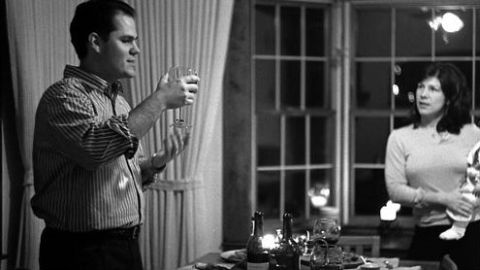Want a better marriage? Then Find some Couple-Friends

Do you and your partner have “couple friends”–other couples that you socialize with as a couple? Have you thought about their role in your marriage?
University of Maryland professor Geoffrey Greif has. He and co-author Kathleen Holtz Deal conclude in Two Plus Two: Couples and their Couple Friendships that these friendships are surprisingly important to marital wellbeing.
Their book is based on interviews with 123 couples, 122 partners who were interviewed alone, and 58 divorced people, as well as a survey.
Among many other benefits, couples friendships “provide a mirror on how other couples handle such issues as raising children, balancing work and love lives, and taking care of aging parents,” Greif told me by email.
When the couple relationships are strong, they also fill something like a marriage mentor role for other couples. “They offer a window into how loving couples interact,” Greif says. “Does he include her in conversations when the four of them are out? … Does she help him tell a story in a supportive way? Couples watch how their friends handle each other [and] their daily struggles, and learn alternative methods of interacting.”
(Conversely, Greif’s comments remind me of a column I wrote on the habits of not-so-happy couples, in dinner party settings. They basically do the opposite of Greif’s loving couple. They interrupt each other, exploit the occasion of a social audience, and outing, to litigate ancient arguments, and ignore each other’s stories with the “50-yard stare” of boredom).
However valuable these couple friendships may be, there seem to be fewer of them, as marital social life has withered over the last 60 years.
I ask Greif about this, and he notes that there are many more companionate marriages today, or “marriages among equals. I think what has replaced the backyard neighbor…is the stronger, peer-to-peer marriage that is built on economic and social equality between the sexes.”
This absolutely jibes with my insight that post-modern marriages function more like friendships today and that we’re “marrying out best friends.” In my opinion, this has upsides as well as some downsides for marriage.
Greif also says that “couple friendships ebb and flow” over time, just as a marriage does. “They’re most important at the beginning of a first marriage when a couple needs to define themselves as a couple. Ten years in, if the couple is having children…they’re putting time and effort into child care and to work. Friendships take a back seat.” But later in life, when “children are not interested in parents beyond driving them to the mall, the need and time for friendships re-emerge.”
Greif says that couple friendships fall into some broad categories. “Seekers” are couples who tend to be extroverted and want to add new couple friends. “Keepers” may be open to meeting new couples, but don’t seek it out. They feel like their plate is full. “Nesters” tend to be more introverted couples who are “content being alone with just each other or consider only one or two other couples their friends.” Sometimes a couple is a hybrid of these social types.
“A couple’s style of couple friendship varies somewhere along an axis of emotion sharing and fun sharing,” Greif found. “Most couples are fun sharing with other couples. They want to go out with a couple just for fun.”
My husband and I had an emotion-sharing couple friendship that we both cherished, but my husband probably would prefer a fun-sharing couple friendship as a rule, and it caused conflict in the couple friendship, because our styles and preferences were incompatible.
Some of my couple friendships fall in a third category. They’re more like “idea-sharing” friendships. They’re based on conversation and sharing, but not so much of emotions as thoughts about culture and politics, or our creative pursuits, or ideas. I guess for me, that nerdily falls closer to the fun side of the spectrum.
Greif’s work intrigues me because in my book, a cultural commentary, I argued for being “married in public” again rather than in isolation as one remedy to the semi-happy marriage, and it’s good to read new sociological research that instantiates the importance of a shared marital social life.
I would add to the couple-friendship’s benefits that these relationships cultivate a deeper potential for charm within a marriage: The more people, friends, new and interesting things and social dynamics that a marriage has to react to and share, the more it remains capable of enchantment and novelty.
What about individual friendships? I’d always heard that they were important in marriage. “The more the merrier (up to a point),” Greif agrees.
He asked divorced interviewees what happened to their friendships after the breakup, and “it is clear that people should maintain both individual and couple friendships,” he says. “Putting all your eggs in one basket can be risky.”
Indeed, a divorce can provoke something of a custody battle among couple-friends. In some cases, friends almost self-sort and remain friends primarily with one of the divorced spouses, and the divorced spouses themselves informally divvy up social events to maintain a half-share, so to speak, in the clique of couple friendships to which they had both belonged, when married.





